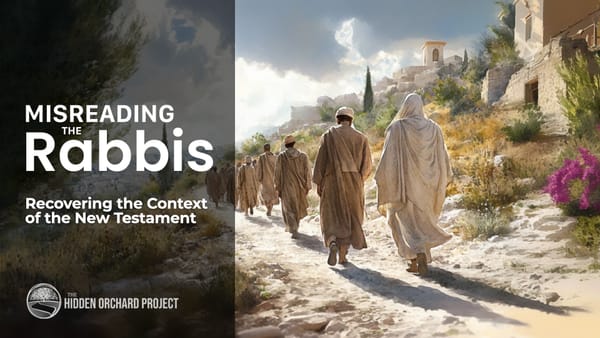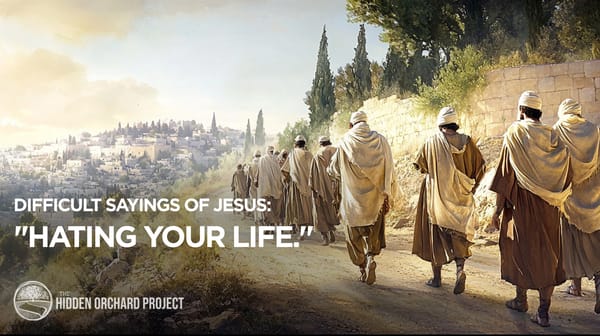Revisiting the Sermon on the Mount
As Jewish Scholar Pinchas Lapide stated, Jesus's teachings in the Sermon on the Mount are timeless, and still relevant today. In essence, they make up the core of a Jewish lifestyle as taught in the Rabbinic tradition.

The late Jewish scholar and theologian, Pinchas Lapide¹, once wrote the following perspective on the Sermon on the Mount:
The Proper view [of the Sermon on the Mount] is that this is timeless and still relevant, and challenging in our day. For me, Jesus is less the founder of Christianity than the instigator of a Christian way of life that has its great manifesto in the Sermon on the Mount: a Christian way of life that at the bottom amounts to a Jewish way of life and, like It, unfortunately, finds far too few imitators in either community of faith.
This excerpt can be found in his book², "The Sermon on the Mount. Utopia or Sermon for Action?." In this work, he seeks to correct many traditional distortions of Jesus's words to understand its message as the original Jewish audience might have.
Checking Our Assumptions
If you notice, Lapide's position advocates a very different set of assumptions than the traditional interpretation.
As we've covered through many articles on the Hidden Orchard Project, false assumptions cause misinterpretations, misunderstandings, and sometimes dangerous theologies³.
Whether intended or not, approaching the Gospels or Epistles with a faulty set of assumptions results in error.
Often, the Sermon on the Mount is read as Jesus's replacement of the "Old Testament" and Jewish tradition. Of course, this could not be further from the truth, according to the texts themselves.
However, as Lapide remarks, Jesus nips this in the bud early into his message, openly stating that he has most definitely not abolished the Torah⁴.
8 Ways to Misinterpret the Sermon on the Mount
Transcending the simple textual or interpretive errors, Lapide remarks that there are (8) common assumptions he has encountered when approaching this text. In summary, in my own words, they are as follows:
- The Perfectionist. One must live up to these ethics perfectly to be blessed. Lapide calls it a kind of "Exaggerated Legalism."
- Unrealizability. These demands are super-human and only intended to drum into humans that we are incapable of achieving them. In other words, it's hopeless, so why try?
- Interim-Ethics. These are last-minute ethics to strive for before the final judgment. Though lofty, they are not sustainable. This view can rob the texts of their modern relevancy.
- Utopian ideals. Set against the political situations of the past 4,000 years.
- The Narrow View. This teaching is only for Jesus's primary disciples. The message is only meaningful to these students at this particular time.
- Timeless Maxims. In this view, the teachings are seen as "romantic radicalism," intended to bypass the complexity of life. These maxims 'Demand everything, but impose nothing." In other words, simple and memorable, but not substantial.
- Ethics for Self-centered perfection. Primarily individual-focused, where society is merely a tool or a backdrop for salvation or a personal way to connect with G_D, lacking the dimension of the collective.
- Historical View. Contextually set against the politics and oppression of the Roman Empire. In this view, Jesus's teachings are perceived as non-violent resistance to physical, religious, and economic oppression.
However, as Lapide stated in the opening quote, Jesus's teachings in the Sermon on the Mount are timeless, and still relevant today. In essence, they make up the core of a Jewish lifestyle as taught in the Rabbinic tradition.
A New Foundation
From here, let us build a proper foundation from which to begin re-reading these texts. Below are a few [of many] assumptions to begin with.
1. We Are Reading a Thoroughly Jewish Text
What may not be commonly accepted by some is that these teachings are thoroughly Jewish, leveraging common and broadly understood metaphors and parables that are to be found only in the Rabbinic tradition.
In fact, virtually every stanza in the Sermon on the Mount has a parallel in the Talmud or Midrash. When read together, these add valuable insight and depth into Jesus's words.
2. "The Kingdom" Exists Now, and We Are Not There Yet
The Kingdom [of Heaven] co-exists with - and is entangled with - the present physical reality that we perceive most prominently. We have looked at this in detail in this article⁵.
The work ahead of us is to live in the physical world with the full awareness and intention to connect with the upper. This idea aligns with Kabbalah and Chasidic Judaism that we must unify the below and the Above.
"may your kingdom come, may your will be done on earth as it is in heaven." - Matthew 6:10
While there is indeed a future fulfillment of this reality, we are to remember that our present moments are colored with a holistic view as Jesus encourages one to look at the higher dimension of their service to the Creator.
3. Life Is an Opportunity to Seek the Creator
The Sermon on the Mount encourages individuals to use their present lives as an opportunity to seek G_D. This teaching echoes the fundamental Jewish concept of "tikkun olam," which suggests that our actions and choices in this world can elevate our souls and draw us to "know" the Creator.
For instance, when Jesus says:
"Blessed are the peacemakers, for they will be called children of G_D" - Matthew 5:9
He underscores the idea that the pursuit of peace is not only a worthy goal but something that will require action and will likely have to overcome obstacles. This advice is not limited to professional peacekeepers but for everyone. Peace, that is, Shalom, is wholeness and something for all of us must strive for.
4. Everything We Do Matters
Another assumption we should have when reading the Sermon on the Mount is that everything we do, say, and think matters.
In the Sermon on the Mount, Jesus emphasizes ethics, personal conduct, and the consequences of one's actions. This belief is rooted in the idea of "mitzvot," the commandments in Judaism, that guide every aspect of life and encourage ethical behavior.
Simple observance of mitzvot is not the end of one's development. Jesus encourages his students to continue to strive for higher levels. Thus, every action and decision can either bring one closer to G_D or create distance.
With this, his innovations⁶ to bring insight into the Torah commandments fit squarely within the language and norms of Rabbinic thought.
Conclusion
The Sermon on the Mount could be considered among the most profound and influential texts - still relevant today and challenging to readers from all walks of life.
Traveling all the way from the humble banks of the Sea of Galilee, these teachings have concealed and spread some of the Torah's most important concepts. This is no accident.
By understanding and appreciating these ideas in their fullness, we can gain a richer and more comprehensive perspective on the wisdom contained within the Sermon on the Mount and the enduring relevance of Jewish tradition for people of all faiths.
Notes:
¹Pinchas Lapide - https://en.wikipedia.org/wiki/Pinchas_Lapide
² "The Sermon on the Mount. Utopia or Sermon for Action?" - Pinchas Lapide
³ https://www.thehiddenorchard.com/replacement-theology-and-the-test-in-our-time/
⁴ https://www.thehiddenorchard.com/abolishing-the-torah/
⁵ https://www.thehiddenorchard.com/5-worlds-jewish-cosmology/





